Deng Long: New York supermarket king
Updated: 2014-11-21 07:27
By AMY HE in New York(China Daily USA)
|
|||||||||
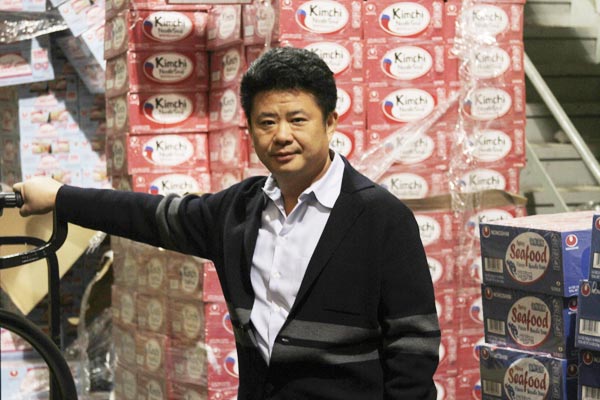 |
|
Deng Long, chairman of the US Chinese Chamber of Commerce, helps organize various cultures events sponsored by members of the chamber. Amy He / China Daily |
At the front of a New York Mart are rows of fresh vegetables and tanks holding live seafood. Toward the back of the store are shelves and shelves filled with Chinese food - tea, snacks, and spices - as well as medicine and kitchenware items.
They are the items stocked at a typical New York Mart, a Chinese supermarket founded by Deng Long in 2001. What started as one store is now a chain of 11 across the East Coast, with expansion set for next year.
When Deng came to the United States 23 years ago from China, he started out in construction work, like many other Chinese immigrants.
He worked at a Chinese-owned construction company earning $50 a day for four months before getting fired. Youthful arrogance on the job, he said. Then Deng decided that he wanted to be his own boss. So he started a one-man construction operation, and one of his first jobs was for a Chinese couple who lived in Connecticut.
At the time, Deng said he barely spoke any English and had to fib a bit about his work experience to get the job. "I told them I had five years' experience with construction, because I knew if I had said anything less, they wouldn't have faith in my ability," he recalled.
Deng ran his construction company for a few years, taking on more jobs across the tri-state New York metropolitan area.
In 1995, his company helped build a warehouse for a Chinese food-import company. Deng noticed that they imported a lot of food products and goods that Chinese regularly purchased. Although his construction company had increased in size, business was never booming, and Deng became curious about the food-import sector.
He got in touch with friends and colleagues in China to see if there were opportunities to import food. He began importing mushrooms for the food company, but because he was so new to the trade, he barely made any money from the transactions.
"It's hard to do business with overseas Chinese when you first start, because there's a lack of trust," he said. "So in the end, I stopped importing to these guys and took the money I earned to start another company."
Deng left the construction business, used his funds and pooled money from friends to rent a warehouse for his own food-import business, called Strong America Group. He began by importing more mushrooms and selling directly to Chinese restaurants that used the ingredient in abundance.
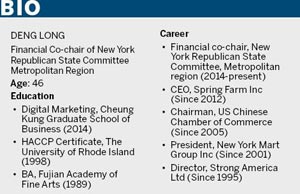
"I went from Chinese restaurant to Chinese restaurant, trying to persuade them to switch their suppliers," he said.
It was during door-to-door selling that Deng said he realized that the Chinese immigrant community was getting bigger in New York. More and more were coming from Fujian province, with immigrants being smuggled into the city from Fuzhou — the capital of Fujian — and reaching its peak in the 1990s.
But the food being imported by many companies primarily catered to Chinese who came from Guangdong province, whose Cantonese cuisine required different ingredients than that consumed by Fujianese immigrants. And that was when Deng realized he had the chance to grow.
"There were so many Fujianese coming into the country. Everyday, they were being snuck in, and they all wanted to eat foods from home," he said.
There weren't as many companies importing foods for Fujianese tastes, so Strong America's began to grow rapidly, and eventually Deng shifted to importing all kinds of Chinese food goods, not just catering to Fujianese immigrants. The company expanded outside of importing to just New York stores, and began working with merchants in New Jersey, Pennsylvania, Maryland, Massachusetts and Florida.
Deng also decided to turn his attention elsewhere.
"When we were working with supermarkets and grocery stores, we were often paid months after our transactions were completed," Deng said. "And this kept happening, so our cash flow was constantly tight. I decided that we had to go a step further."
That would mean creating a better cash-flow business, which meant opening the supermarkets himself.
In 2001, Deng acquired his first supermarket in Elmhurst, Queens, and has since launched the New York Mart chain. The 11 New York Marts earned about $300 million in revenue in 2013, according to Deng.
New York Mart Group employs over 1,000 people, with headquarters and warehouses in Long Island City, Queens. Deng is looking at opening three more supermarkets next year, adding to the seven in New York, two in Boston, and one each in New Jersey and Florida.
But now Deng and his team also want to focus on e-commerce, noting that both young and old shoppers are finding it more convenient to purchase items online than go to stores. This is particularly happening in cities with a growing number of Chinese that don't yet have fully-developed Chinese communities, making the opening of a physical store a bigger investment than having shoppers make online purchases.
Deng, who lives in Long Island with his wife and three sons, juggles overseeing his food business with working as president of the US Chinese Chamber of Commerce, as well as his new role of finance co-chair of the metropolitan region for the New York Republican State Committee.
As chairman of the US Chinese Chamber of Commerce, Deng helps organize various cultures events sponsored by members of the chamber.
"We like to exhibit Chinese arts at places like the United Nations headquarters," he said. It helps Americans understand Chinese culture better, he added.
Deng also leads business groups over to China to help them understand Chinese business culture better, because there are often misconceptions about how goods are made and the quality of production.
"There needs to be clarification sometimes, and that's our job, to show them," he said.
All of that is why he came to the US, he said.
"When I first landed in the US, I saw the three US flags hanging at the airport, and I cried. I stepped out and I kissed the ground out of gratitude, and I promised myself that this was going to be a new beginning. Twenty-three years later, I can say that it was all worth it."
amyhe@chinadailyusa.com
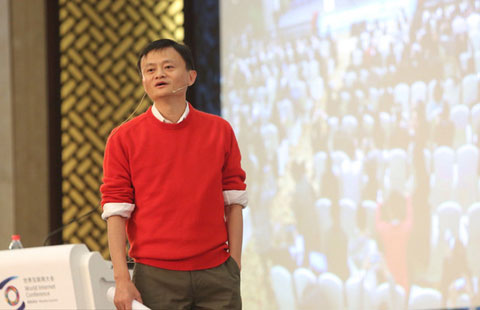
 Jack Ma shares tips at Internet summit
Jack Ma shares tips at Internet summit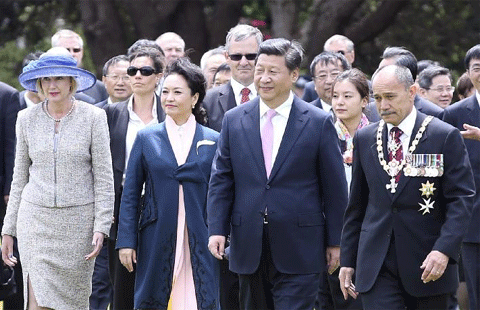
 President Xi attends welcoming ceremony in Wellington, New Zealand
President Xi attends welcoming ceremony in Wellington, New Zealand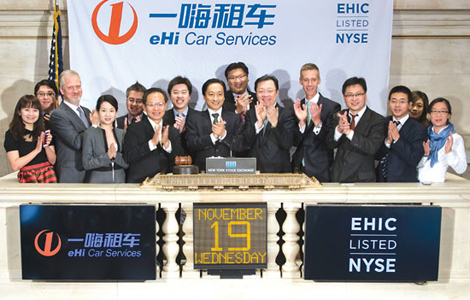
 Car-rental firm revs up Wall Street
Car-rental firm revs up Wall Street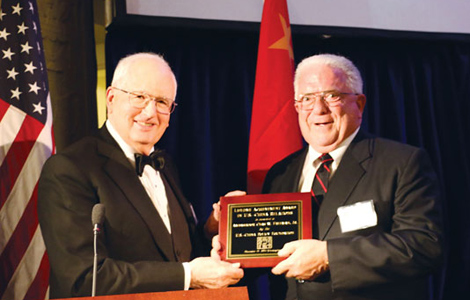
 Cui hails Obama's China trip
Cui hails Obama's China trip
 Peek into the life of Puju performer
Peek into the life of Puju performer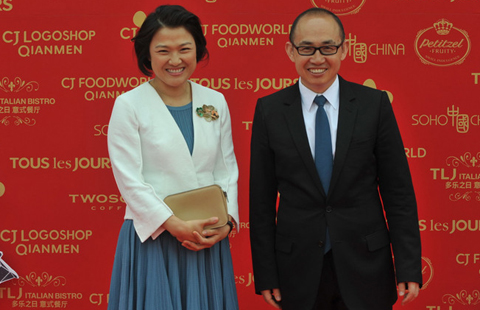
 Top 10 most powerful businesswomen in China
Top 10 most powerful businesswomen in China
 Top 10 most powerful businesswomen in China
Top 10 most powerful businesswomen in China
 Love conquers leprosy in Luduo village
Love conquers leprosy in Luduo village
Most Viewed
Editor's Picks

|

|

|
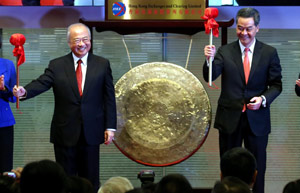
|

|

|
Today's Top News
China wants its voice heard in cyberspace
New Zealand welcomes Xi
Alipay brings the frenzy of Black Friday to China
Emission goals in China on target for 2020
Li positive on govt-Qualcomm resolution
E-commerce will change global trade: Jack Ma
Jack Ma shares tips at Internet summit
Texas talks business with China
US Weekly

|

|








